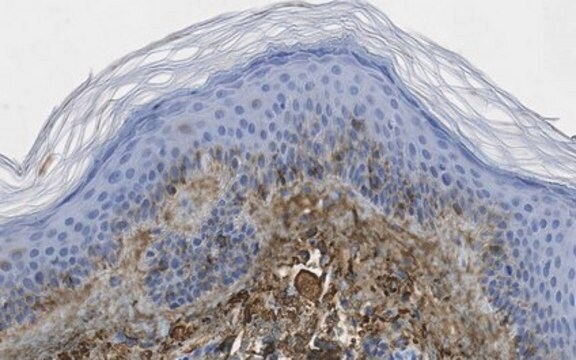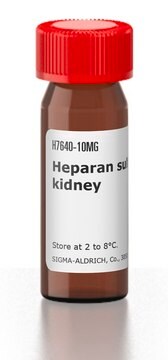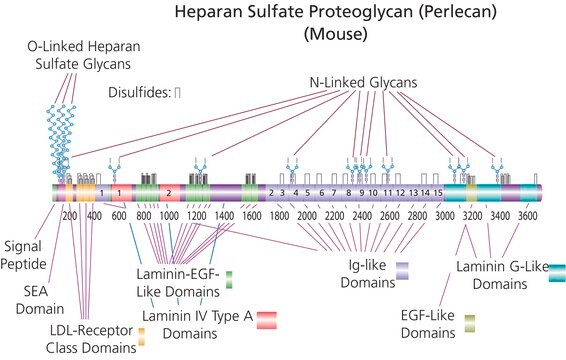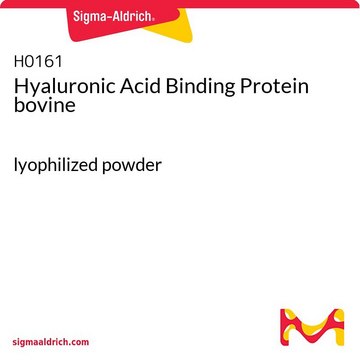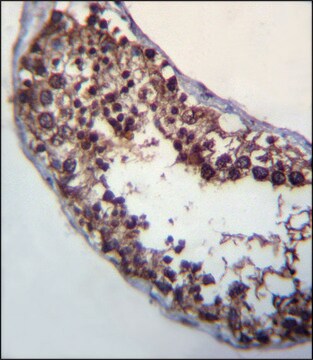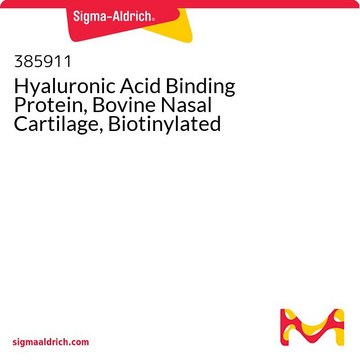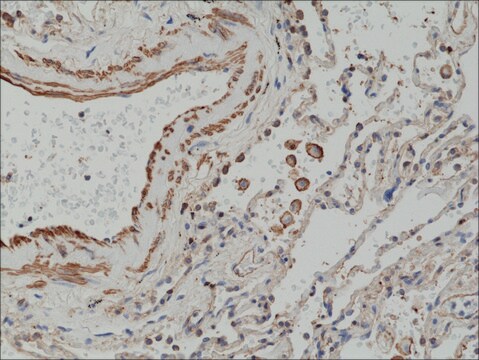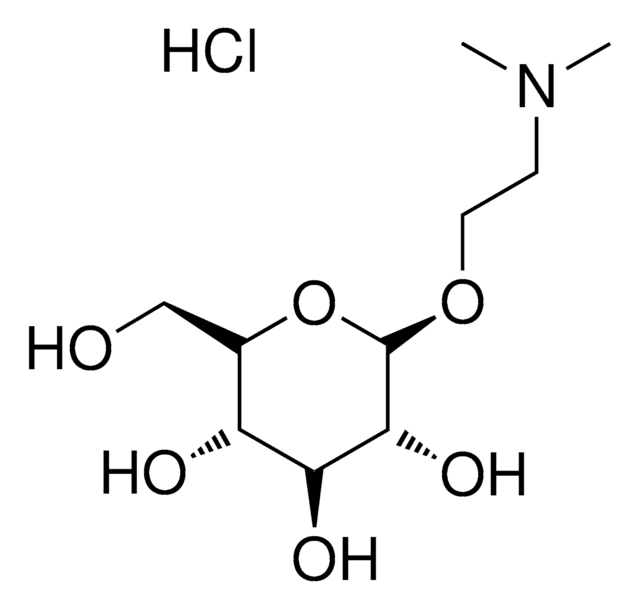MAB2022
Anti-Keratan Sulfate Antibody, clone EFG-11
ascites fluid, clone EFG-11, Chemicon®
Zaloguj sięWyświetlanie cen organizacyjnych i kontraktowych
About This Item
Kod UNSPSC:
12352203
eCl@ss:
32160702
NACRES:
NA.41
Polecane produkty
pochodzenie biologiczne
mouse
Poziom jakości
forma przeciwciała
ascites fluid
klon
EFG-11, monoclonal
reaktywność gatunkowa
sheep, bovine, pig, canine, mouse, human
producent / nazwa handlowa
Chemicon®
metody
ELISA: suitable
radioimmunoassay: suitable
western blot: suitable
izotyp
IgG2b
numer dostępu NCBI
numer dostępu UniProt
Warunki transportu
dry ice
docelowa modyfikacja potranslacyjna
unmodified
informacje o genach
human ... LUM(4060)
Specyficzność
Recognizes 2-3 disaccharide units on both skeletal (type II) and corneal (type I) keratan sulfate chains either in isolated or proteoglycan-bound form. The epitope is resistant to proteolytic or alkaline cleavages and partially sensitive to keratanase or other endo-B-galactosidase treatment.
Immunogen
Human articular cartilage proteoglycan digested with chondroitinase ABC.
Zastosowanie
Anti-Keratan Sulfate Antibody, clone EFG-11 is an antibody against Keratan Sulfate for use in ELISA, RIA & WB.
Research Category
Cell Structure
Cell Structure
Research Sub Category
Cytokeratins
Cytokeratins
Western blot at 1:1000 - 1:4000
ELISA at 1:5,000-1:20,000
RIA at 1:30,000-1:500,000
May be used in a competitive inhibition assay to measure keratan sulfate levels.
ELISA at 1:5,000-1:20,000
RIA at 1:30,000-1:500,000
May be used in a competitive inhibition assay to measure keratan sulfate levels.
Postać fizyczna
Ascites liquid, no preservative.
Przechowywanie i stabilność
Maintain at -20°C in convenient aliquots for up to 12 months. Avoid repeated freeze/thaw cycles.
Informacje prawne
CHEMICON is a registered trademark of Merck KGaA, Darmstadt, Germany
Oświadczenie o zrzeczeniu się odpowiedzialności
Unless otherwise stated in our catalog or other company documentation accompanying the product(s), our products are intended for research use only and are not to be used for any other purpose, which includes but is not limited to, unauthorized commercial uses, in vitro diagnostic uses, ex vivo or in vivo therapeutic uses or any type of consumption or application to humans or animals.
Ta strona może zawierać tekst przetłumaczony maszynowo.
Kod klasy składowania
10 - Combustible liquids
Klasa zagrożenia wodnego (WGK)
WGK 1
Temperatura zapłonu (°F)
Not applicable
Temperatura zapłonu (°C)
Not applicable
Certyfikaty analizy (CoA)
Poszukaj Certyfikaty analizy (CoA), wpisując numer partii/serii produktów. Numery serii i partii można znaleźć na etykiecie produktu po słowach „seria” lub „partia”.
Masz już ten produkt?
Dokumenty związane z niedawno zakupionymi produktami zostały zamieszczone w Bibliotece dokumentów.
E J Thonar et al.
Arthritis and rheumatism, 28(12), 1367-1376 (1985-12-01)
We have developed an enzyme-linked immunosorbent-inhibition assay which makes use of a monoclonal antibody specific for keratan sulfate to quantify keratan sulfate present as single chains in adult human serum. In adults hospitalized with conditions not thought to affect the
Proteoglycan epitopes as potential markers of normal and pathologic cartilage metabolism.
V C Hascall et al.
Arthritis and rheumatism, 30(5), 586-588 (1987-05-01)
Respiratory syncytial virus infection of human airway epithelial cells is polarized, specific to ciliated cells, and without obvious cytopathology.
Liqun Zhang, Mark E Peeples, Richard C Boucher, Peter L Collins, Raymond J Pickles et al.
Journal of virology null
Transplantation of mesenchymal stem cells in a canine disc degeneration model.
Akihiko Hiyama,Joji Mochida,Toru Iwashina,Hiroko Omi,Takuya Watanabe,Kenji Serigano et al.
Journal of Orthopaedic Research : Official Publication of the Orthopaedic Research Society null
Liping Yang et al.
Journal of the Association for Research in Otolaryngology : JARO, 19(4), 353-362 (2018-04-25)
Otoconia-related vertigo and balance deficits, particularly benign paroxysmal positional vertigo (BPPV), are common. Our recent studies in humans show that, while BPPV prevalence greatly increases with age in both genders, peri-menopausal women are especially susceptible. In the present study, we
Nasz zespół naukowców ma doświadczenie we wszystkich obszarach badań, w tym w naukach przyrodniczych, materiałoznawstwie, syntezie chemicznej, chromatografii, analityce i wielu innych dziedzinach.
Skontaktuj się z zespołem ds. pomocy technicznej